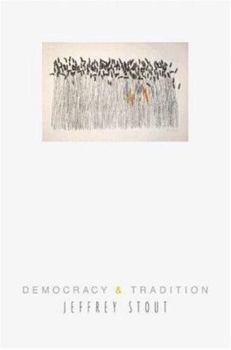Democracy and Tradition
Select Format
Select Condition 
Book Overview
Do religious arguments have a public role in the post-9/11 world? Can we hold democracy together despite fractures over moral issues? Are there moral limits on the struggle against terror? Asking how the citizens of modern democracy can reason with one another, this book carves out a controversial position between those who view religious voices as an anathema to democracy and those who believe democratic society is a moral wasteland because such...
Format:Paperback
Language:English
ISBN:0691123829
ISBN13:9780691123820
Release Date:July 2004
Publisher:Princeton University Press
Length:368 Pages
Weight:1.20 lbs.
Dimensions:0.9" x 6.1" x 9.1"
Customer Reviews
2 ratings
Dense but very rewarding pragmatist argument for the American democratic tradition
Published by Thriftbooks.com User , 18 years ago
Stout's closely-argued book argues in favor of a public sphere that includes the voices of religious people but resists efforts from Christian new traditionalists on one side and secularists on the other to reduce the conversation to a single foundation. His criticisms of MacIntyre and Hauerwas in the middle chapters are especially crucial, as those writers hold tremendous sway over certain mainline Protestants and Catholics. Stout successfully argues that it is best for Christianity to be involved in the democratic process. I did find the final chapters (8-12) very dense and tough going. Stout warns about this in the introduction, but I still feel like he could have unpacked some of the denser sections a little bit. I am not a professional philosopher, but I'm not entirely unsophisticated, either. I still felt completely lost at a few points. In these chapters, it's also difficult at times to see the connection to the larger argument. In the conclusion, the author wraps up the threads of the three parts into a beautiful, powerful argument in the tradition of American pragmatism for an enriched democracy that draws the allegiance, participation, and criticism of a broad, diverse citizenry. Very highly recommended.
The Tradition of Democracy
Published by Thriftbooks.com User , 20 years ago
Stout eloquently argues that Democracy itself, which is considered the antithesis of tradition by many, constitutes a tradition. He argues that within the history of the democratic tradition, as articulated by people like Emerson, Whitman, Dewey, and Ellison, is a set of virtues and vices that correspond to a democratic conception of character. Among the virtues it extols are piety, hope, and charity. He then forges a way between Rawls and Rorty on one side and MacIntyre and Hauerwas on the other. He vigoursly attacks Hauerwas and the other "new traditionalists" whom he says isolate themselves from the broader conversation in favor of sectarian pursuits. Finally, he articulates a way forward with ethics in a time of pluralism. Religious voices can express contasting justifiably held beliefs in common forum. Each should express their beliefs, support them with reasons, and then engage in immanent criticism of those in oposition. Steeped in pragmatism, Stout argues that ethics can be truthful without defining truth. Further, this can be done without metaphysics. What we are left with is a system that allows for truth claims, pluralism, and public debate. As a longtime reader of Hauerwas it is somewhat painful to give this book 5 stars, but it is well deserved. Although I still have reservations about the democratic project, Stout's book was insightful. Though I found his criticism of the new traditionalists a bit strong, it definately caused me to rethink some of my positions. In the end, if one is committed to democracy but finds ethical discourse challenging, this is the way to go.





